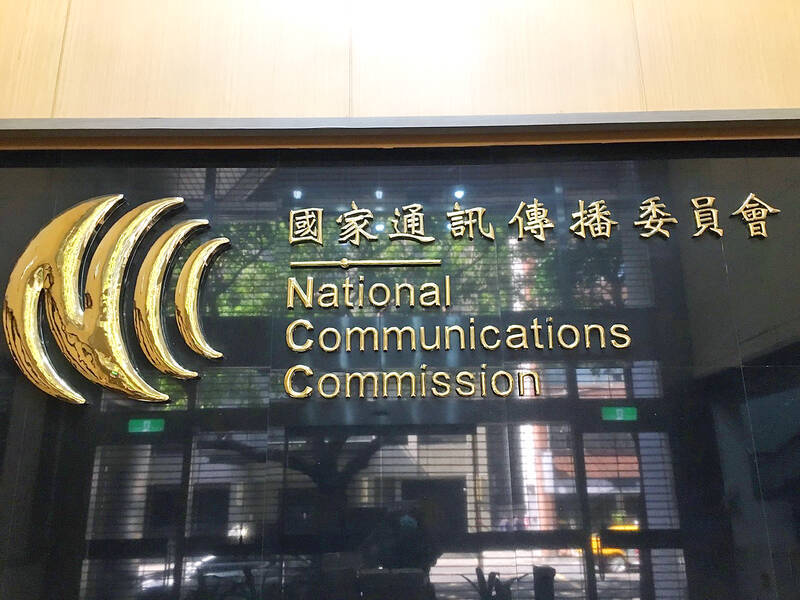A man who illegally set up a mobile base station in a rental car to distribute phishing messages was fined NT$4 million (US$125,984) for contravening the Telecommunications Management Act (電信管理法), the National Communications Commission (NCC) said yesterday.
This was the first time that the telecom regulator issued an administrative fine to an individual for setting up an unauthorized base station.
The Criminal Investigation Bureau’s Telecommunications Investigation Corp on Nov. 18 last year arrested a man surnamed Kuo (郭) near Taipei’s Zhongshan MRT Station for allegedly carrying a mobile base station in a rental car to distribute phishing messages, NCC Vice Chairman and spokesman Wong Po-tsung (翁柏宗) told a news conference yesterday afternoon.

Photo: Yang Mien-chieh, Taipei Times
The illegal mobile base station was confiscated on the spot, he said.
“Recipients of the messages were told that Far Eastern Toll Collection Co (FETC), the operator of freeway toll tag eTag, failed to collect their toll fees, and they needed to re-enter billing information on their credit cards,” Wong said. “They were subsequently instructed to click on a link to a fake Web page and enter their credit card information.”
Kuo and his cohorts added the illegally obtained credit card information to their mobile payment system, allowing them to purchase mobile phones or other high-end electronic products, the commission said.
Telecommunications Investigation Corp further identified through its 165 Anti-Fraud Hotline database 30 more similar cases that happened from September to November last year, in which victims’ credit card information was stolen after clicking on a link in messages allegedly pretending to be sent by FETC or E.Sun Commercial Bank, the commussion said.
The collective financial losses were estimated to exceed NT$3 million, it said, adding that the Yunlin District Prosecutors’ Office on April 10 indicted Kuo and 11 other individuals for contravening the Criminal Code and Organized Crime Prevention Act (組織犯罪防制條例).
After examining the results of the investigation conducted by Telecommunications Investigation Corp, the NCC decided that Kuo had contravened Article 52 of the Telecommunications Management Act for using part of radio frequency band in 1,800MHz without first securing approval from the commission, Wong said, adding that the fine ranges from NT$1 million to NT$10 million.
“By using an illegal mobile base station, Kuo interfered with the use of the frequency band by its legal user, illegally collected personal data from 22 people and reaped illegal profits topping NT$2 million,” Wong said. “As such, the commission decided to toughen the sanction by setting the fine at NT$4 million.”
The mobile base station that Kuo used was able to overwhelm the reception of signals sent by the frequency band’s legal user, as it is a 2G system, which does not have a two-way verification system, Wong said.
The commission is still investigating how Kuo and his cohorts obtained the illegal mobile base station — whether it was imported from overseas or manufactured in Taiwan, he said, adding that the fine for illegally importing or manufacturing radio frequency products is between NT$10,000 and NT$1 million.
Kuo imported five mobile base stations from China, and prosecutors are still tracing four other base stations and more scammers, some media reports said.

The Ministry of Economic Affairs has fined Taobao NT$1.2 million (US$36,912) for advertisements that exceed its approved business scope, requiring the Chinese e-commerce platform to make corrections in the first half of this year or its license may be revoked. Lawmakers have called for stricter enforcement of Chinese e-commerce platforms and measures to prevent China from laundering its goods through Taiwan in response to US President Donald Trump’s heavy tariffs on China. The Legislative Yuan’s Finance Committee met today to discuss policies to prevent China from dumping goods in Taiwan, inviting government agencies to report. Democratic Progressive Party Legislator Kuo Kuo-wen (郭國文) said

The Ministry of Economic Affairs has fined Taobao NT$1.2 million (US$36,900) for advertisements that exceeded its approved business scope and ordered the Chinese e-commerce platform to make corrections in the first half of this year or its license would be revoked. Lawmakers have called for stricter supervision of Chinese e-commerce platforms and more stringent measures to prevent China from laundering its goods through Taiwan as US President Donald Trump’s administration cracks down on origin laundering. The legislature’s Finance Committee yesterday met to discuss policies to prevent China from dumping goods in Taiwan, inviting government agencies to report on the matter. Democratic Progressive Party

Taiwan and its Pacific ally Tuvalu on Tuesday signed two accords aimed at facilitating bilateral cooperation on labor affairs, according to Taiwan’s Ministry of Foreign Affairs (MOFA). The governments inked two agreements in Taipei, witnessed by Foreign Minister Lin Chia-lung (林佳龍) and visiting Deputy Tuvaluan Prime Minister Panapasi Nelesone, MOFA said in a news release. According to MOFA, the agreements will facilitate cooperation on labor issues and allow the two sides to mutually recognize seafarers’ certificates and related training. Taiwan would also continue to collaborate with Tuvalu across various fields to promote economic prosperity as well as the well-being of their

Sung Chien-liang (宋建樑), who led efforts to recall Democratic Progressive Party (DPP) Legislator Lee Kun-cheng (李坤城), was released on bail of NT$80,000 today amid outcry over his decision to wear a Nazi armband to questioning the night before. Sung arrived at the New Taipei District Prosecutors’ Office for questioning in a recall petition forgery case last night wearing a red armband bearing a swastika, carrying a copy of Adolf Hitler’s Mein Kampf and giving a Nazi salute. Sung left the building at 1:15am without the armband and covering the book with his coat. Lee said today that this is a serious